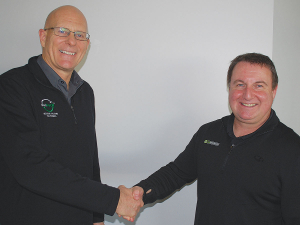Government approves nationwide recycling scheme for primary sector plastics
Rural recycling scheme Agrecovery is welcoming the Government's approval of regulations for a nationwide rural recycling scheme for agrichemicals and farm plastics.
 Plasback's Neal Shaw (L) and Agrecovery's Tony Wilson want to provide the most efficient and cost-effective means to collect and recycle used farm plastic.
Plasback's Neal Shaw (L) and Agrecovery's Tony Wilson want to provide the most efficient and cost-effective means to collect and recycle used farm plastic.
The two main plastic collection programmes in New Zealand’s primary sector have agreed to work together to improve the services they provide farmers and growers.
Agrecovery and Plasback have signed a memorandum of understanding, which aims to provide the most efficient and cost-effective means to collect and recycle used farm plastic.
“Our focus is on finding the best ways to meet the needs of primary producers,” Ag Recovery chief executive Tony Wilson says
“Agrecovery and Plasback have different and complementary strengths and areas of expertise. By working together, we will target our future investments to take farm plastic recycling to the next level.”
The two companies have been collecting and facilitating the recycling of farm plastic in New Zealand for more than 15 years. Both are accredited voluntary product stewardship schemes, under the Waste Minimisation Act.
“Plasback has developed an on-farm collection service for silage wrap and pit covers, while Agrecovery has established a nation-wide drop-off service to recycle agrichemical containers and large drums,” Plasback commercial manager Neal Shaw explains.
“Now our aim is to develop a service that can collect all agricultural and horticultural plastics for recycling.
The two organisations have decided to cooperate at a time when the Government has announced its intention to establish a mandatory, industrywide product stewardship scheme for farm plastics. This is expected to commence in July 2024.
“We want to set up a simple entry point for everyone to get on board, whether they are consumers, other recyclers or suppliers who sell products in plastic packaging,” Wilson says.
This proposed product stewardship scheme will include an up-front stewardship fee on designated farm plastic products, including packaging. AgRecovery and Plasback says they are working with the Environment Ministry to develop a scheme that costs the industry as little as possible, but is still comprehensive enough to collect, process and ship all used farm plastic to domestic and overseas recyclers.
Currently farmers and growers need to deal with some plastics that are not catered for under the current schemes. This is because some businesses supplying these products are not contributing to the cost of their recycling.
“Some companies are working with Plasback and Agrecovery to cover the costs of disposing of their waste responsibly, but others are not,” Shaw says. “The door is open to everyone in the industry to work with us to improve the service we provide.”
He adds that, ultimately, all New Zealand agriculture will benefit from responsible product stewardship.
“If farmers and growers are to attract top dollar for their commodities in the global economy, they will have to prove they farm sustainably,” Shaw adds.
15 Years of Good Work
Agrecovery is celebrating 15 years in operation, with launch of the first container recycling programme back in mid-2007.
Since its inception, it has recycled nearly 3.5 million kg of plastic containers and over 165,000 kg of expired or unwanted agrichemical.
The anniversary was recently celebrated with a special evening at the Grand Hall, Parliament, hosted by Minister for the Environment David Parker.
We now over 100 brands signed up to our programmes with more joining every month,” says chief executive Tony Wilson. “It’s great to see these brands take responsibility for their products and their packaging and ensure a free service for our 16,000-plus members.”
Keratin biomaterials company Keraplast and Wools of New Zealand have signed a new superpremium wool contract which is said to deliver a boost to wool growers.
While things are looking positive for the red meat sector in 2026, volatility in global trade remains a concern, says the Meat Industry Association (MIA).
The quest to find innovative practical, scientific solutions to deal with water-related issues at a catchment level has been the theme of an important conference at Massey University last week.
One of the country's top Māori farms faces a long and costly rebuild to get the property back to where it was before recent storms ripped through it.
The latest Global Dairy Trade auction results have delivered a boost to dairy farmers.
New Zealand potato growers are prioritising value creation from high yields to meet a complex mix of challenges and opportunities, says Potatoes NZ chief executive Kate Trufitt.

OPINION: First on the scene after the recent devastating storms in parts of the North Island were emergency services and selfless…
OPINION: Why can't Christopher Luxon stand up to Winston Peters over the latter’s high-profile attack on the proposed Indian FTA?